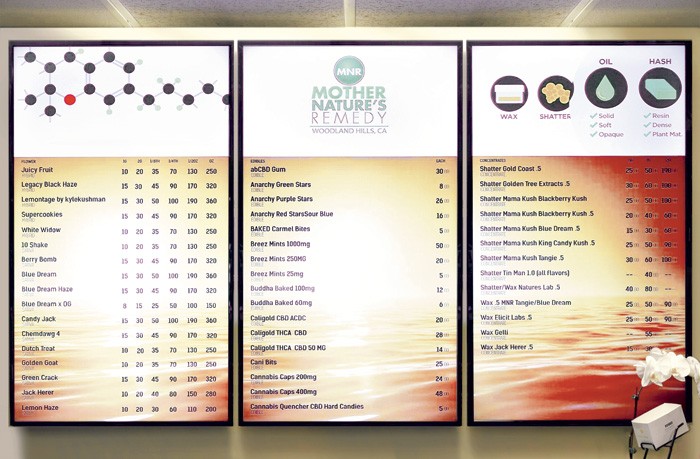Tune in, turn on…and pick up your meds? That’s the scenario unfolding at an increasing number of Southern California cannabis dispensaries thanks to the efforts of APOP Media, which focuses on putting TV systems and interactive menus into waiting rooms, doctors offices, and smoke shops.
The new company hit the ground running. Founded mere months ago by Creative Director Rebecca Brinegar and Chief Executive Officer Matt Young, APOP stands for At Point of Purchase and that’s where these longtime cannabis business veterans are making their mark. By aggressively marketing their TV waiting room systems, they’ve installed 162 units in five months.
APOP’s multi-screen systems provide specially tailored, cannabis-centric content featuring a combination of entertainment, education, and advertising. The company also offers a brand new EZMENU TV programmable interactive dispensary menu system.
Brinegar saw the need for a specialized retail network first-hand, thanks to a decade of experience marketing cannabis brands and services to dispensaries, and also working as a dispensary owner.
She explained, “Every time I would walk into a dispensary I would see patients watching I Love Lucy reruns or the Channel 4 news, and eventually I thought, ‘We have very limited marketing opportunities; very limited point of purchase marketing opportunities. Let’s find a way to remotely program cannabis-driven content and help cannabis brands take that next logical step to commercials.’”
Revenue-sharing is caring
APOP’s goal is to engage dispensaries as a partner, not just a vendor. That’s why the company’s waiting room screens are provided free as a straight revenue share, based on contract length. “We provide the technology, we provide the platform, they obviously provide the retail location, and together we both kind of sell advertising,” said Brinegar. “We obviously take the lead on that, but they have a lot of existing potential advertising clients on their shelves already.”
The advertorial content packages APOP provides run on a fifteen-minute loop, with segments of various lengths starting at fifteen seconds.
“It maxes out at ninety seconds,” said Brinegar, “and a lot of that would be branded content like ‘How to Vape, by W Vapes’ or something along those lines. W Vapes came on really early with us, so we’re appreciative of them, along with other clients like Quality Concentrates, THC Designs, REZN Extracts. We’re kind of in the process of helping a lot of brands get into video and coming on board.”
A programmable ticker that runs across the bottom of the screens where clients can promote special offers, highlight social media mentions, call attention to shop hours, or make other announcements.
“The goal,” said Brinegar, “is obviously to push the advertisers, because every second of that reel is valuable to us, our retail partners, and the advertisers. Every minute of that screen is monetizable.”
The company is beta testing a new platform that will let advertisers build and manage their own campaigns and select the exact dispensaries in which they want to advertise.
Taking the plunge: it all ads up
Part of the win-win-win nature of the setup is that APOP also helps some brands venture into commercials.
“For a lot of the cannabis companies, you don’t have people with the traditional marketing backgrounds. So, we’re helping walk them through that process.
“We’ve come up with a great promotion that we do with one of our content partners, PROHBTD, where we can get companies into a commercial for like three grand, which is relatively cheap by industry standards. Many in the cannabis industry don’t have much experience with what things like traditional media cost. When you show a real commercial’s price tag, it’s kind of a shocker. So, we’re trying to deliver high production value for a lower cost to help ease them into the market.”
APOP is not the only company trying to capture the point-of-purchase market space, but once again Brinegar stressed the strategic advantage of partnerships as one of the company’s strengths.
“We’re setting ourselves apart from the competition by being really strong on the creative side. That’s what appeals to our partners PROHBTD Media and VICELAND Media. They both have really strong creative teams, so they’re not just looking to jump on board with anyone who could throw a TV up in a dispensary. They want to work with a company that has a compatible brand and culture.”
No stoner left unturned
Emphasizing the need to move past nonstop “stoner” content all day long, APOP and its content partners aim to elevate the medium with more professional and engaging content that will appeal to the next generation of cannabis companies and consumers. The change is driven, in part, by the shifting legal landscape, which Brinegar said is bringing many “new users into the market space, and we’re interested in helping them along.”
“PROHBTD has a series called ‘Learn,’ which is constantly in our rotation, where they explain ‘What is Vaping,’ ‘What are Concentrates,’ all this basic information. Similarly with VICELAND. We’re facilitating for them. They’re basically doing a Weed Week 420, and they’ve got a lot of events planned around [Los Angeles]. They’re coming into town this week to shoot a lot of stories we’ve turned them on to.”
She said early-adopter advertisers, dispensaries, patients, and content partners all will reap the benefit of that synergy, noting, “in these early stages, we are super value-added. We present our clients with every marketing opportunity that comes across our desks, be it an MTV product placement, Hollywood gift bag opportunity, coverage via VICELAND, or numerous press opportunities. We are so appreciative of the clients that believe in us and support us that we utilize every resource we have to help their brands succeed.”
Taking advantage of the low-hanging fruit of captive audiences in waiting rooms seems like a smart move for everyone involved. Especially with the anti-cannabis Trump administration now controlling the regulatory hammer.
“We’re looking at a lot of cannabis regulation potentially coming down on us soon,” said Brinegar. “There’s a lot of talk about outlawing or restricting cannabis billboards and print ads, which only amplifies the point-of-purchase opportunity a cannabis brand has. We’re in retail, the patient’s right there, and they can’t take their eyes off the screen. We hear it from the dispensary operators all the time.
“There really is no better place to be in the market then at point of purchase.”
APOP’s EZMENU TV
It’s just click, click, click. Done.

APOP’s brand-new interactive EZMENU TV system will soon be available. Here’s what you need to know:
- Setting up a menu board is easy-peasy, according to APOP co-founder Rebecca Brinegar. By pulling from an existing menu database, a system can be programmed in just a few clicks.
- But much or all of the cost can be defrayed, because pricing for the APOP Ad Menu Platform varies by how many advertisers are featured on a dispensary’s menu as well as the size, brand, and number of TVs shops install. Other variables include which template, background, aspect ratio, and font options they choose.
- While APOP’s dispensary TV promotional loop screens are free as part of thee company’s revenue-sharing model, doctors’ offices, and retailers, the new menu systems are more of a hardware purchase for shop owners.
- APOP provides all the technology on the back end for the menu boards, which also can include video or animations to enhance impact (and provide another monetization opportunity).
- “We provide a basic menu template, but the dispensary can insert their own menu background and/or work with a designer to easily customize something that reflects their retail brand aesthetic,” Brinegar said.
- “The Backend System is just super clean. They just log in and pull up the menu content from an existing menu content platform. It’s just click, click, click. Done.”











